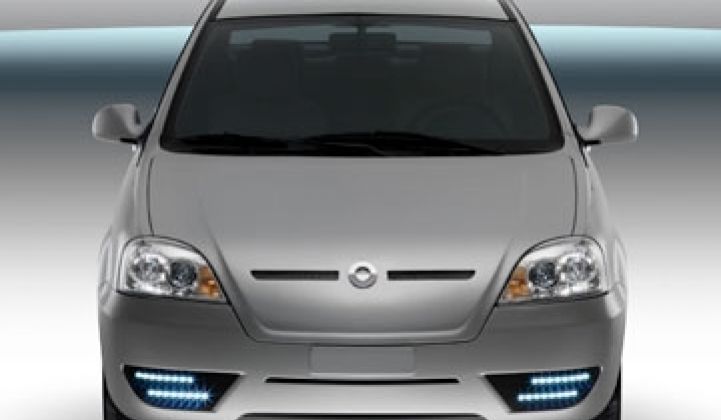Henry Paulson's new prescription for economic growth for the U.S.? Invest in Chinese know-how.
Coda Automotive – which wants to sell an all-electric sedan in the U.S. next year – has lined up $24 million in a second round of funding and, to a certain degree, it's an unusual group of investors.
The group includes Paulson – the former Goldman Sachs titan who became a familiar face to most Americans when the economy collapsed during his tenure as U.S. Treasury Secretary last year – as well as Thomas "Mack" McLarty, the former chief of staff for Bill Clinton, Tom Steyer, a noted energy investor and one of the large donors to Stanford's Precourt Institute for Energy Efficiency, and former Edison International CEO John Bryson. The VC firm Angeleno Group and company insiders also invested.
Coda was spun out of Miles Automotive earlier this year. Miles specializes in low-speed electric cars for military bases and college campuses.
By contrast, Coda will make an all-electric, freeway legal car that will sell for around $45,000 (before $7,500 in federal tax credits). Coda wants to sell it to consumers in 2010. That's more expensive than the GM Volt or Nissan electric cars, but not outrageously more – GM's Volt is slated to come out at around $40,000.
So how will a small company pull that off?
Coda's car is based around a gas-burning car already produced in China by state-owned Hafei. Engineers at Hafei and Coda will tweak and test it to bring it up to western driving and safety standards, but using an existing car, ideally, will help cut engineering and testing costs and time. Partnering with Hafei, which makes 200,000 cars a year, also means that Coda won't have to build a factory.
Whether the company can pull this off, and how long it might take, is an open question. Japanese automakers were able to break into the U.S. market in a big way after several years because of the Arab oil embargo of 1973. Nissan (then Datsun) also scored with sports car drivers with its Z line. Korean manufacturers struggled for a number of years but finally broke through with low prices and long warranties.
China's reputation for quality has never been particularly high in the west and "state-owned manufacturer" rarely warms the cockles of consumers' hearts. Whether it's true or not, it is a barrier Coda will have to overcome and one that U.S. automakers will emphasize.
The company's investors may also help it navigate the thicket of Washington. In June, Coda Battery Systems, which will make batteries for the cars, linked up with Yardney Technical Systems to build a battery factory in Connecticut. The joint venture has applied for stimulus grants. Coda Battery Systems grew out of a joint venture with Tianjin Lishen Battery Joint Stock Co., a large lithium-ion battery manufacturer, for its batteries.
Coda's car will come with a 333-volt lithium-ion battery and a driving range of 90 to 120 miles. A full charge on a 220-volt outlet will take six hours. Charging the battery for a 40-mile commute can be completed in two hours.
Image courtesy Coda Automotive



